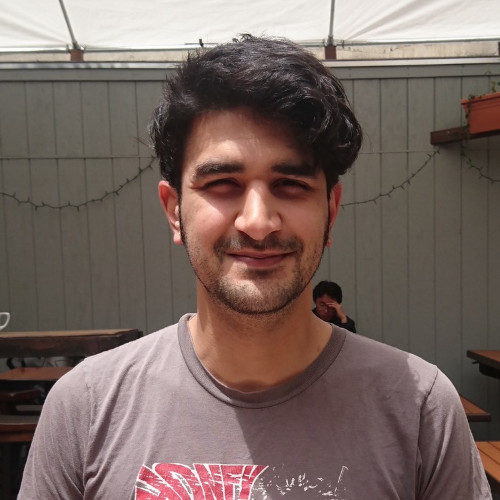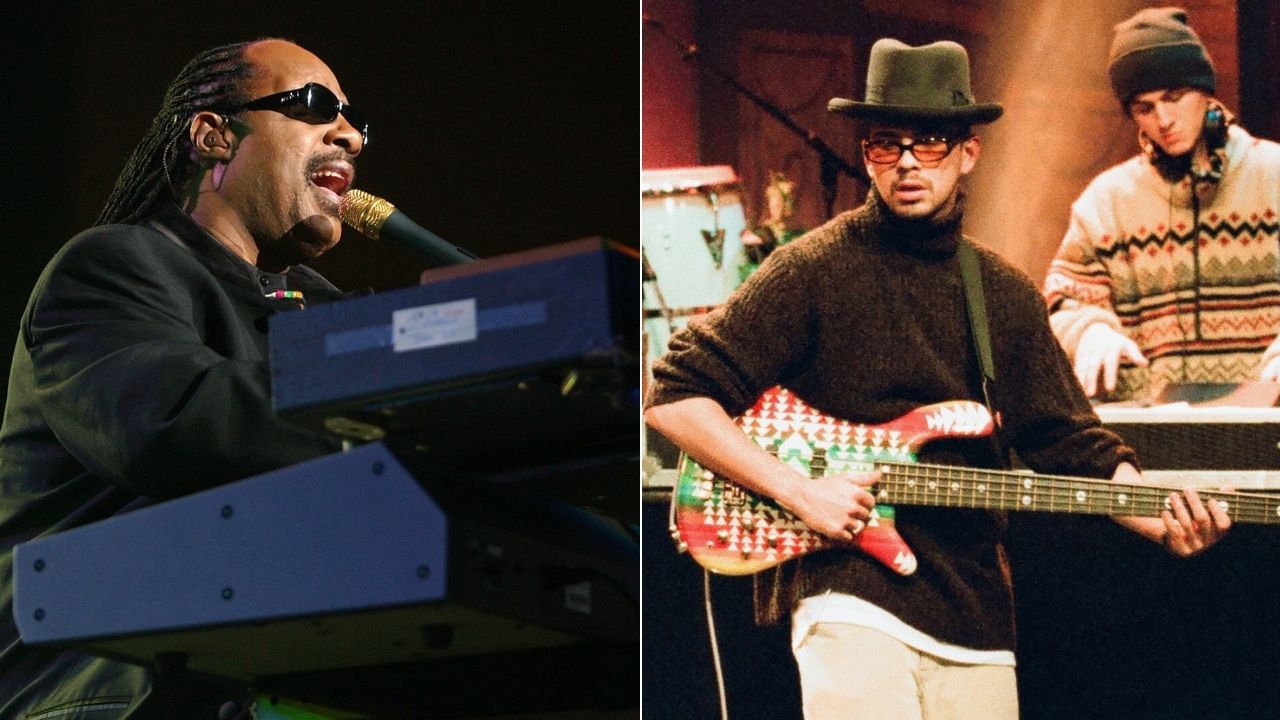Billy Howerdel: “With A Perfect Circle, I was always concentrating on bigger guitars – on this album, I wanted the compositions to take center stage”
The APC guitarist talks tapping into his formative years on his debut solo album, What Normal Was, and why it's hard for him to let go of physical amps in place of amp modelers
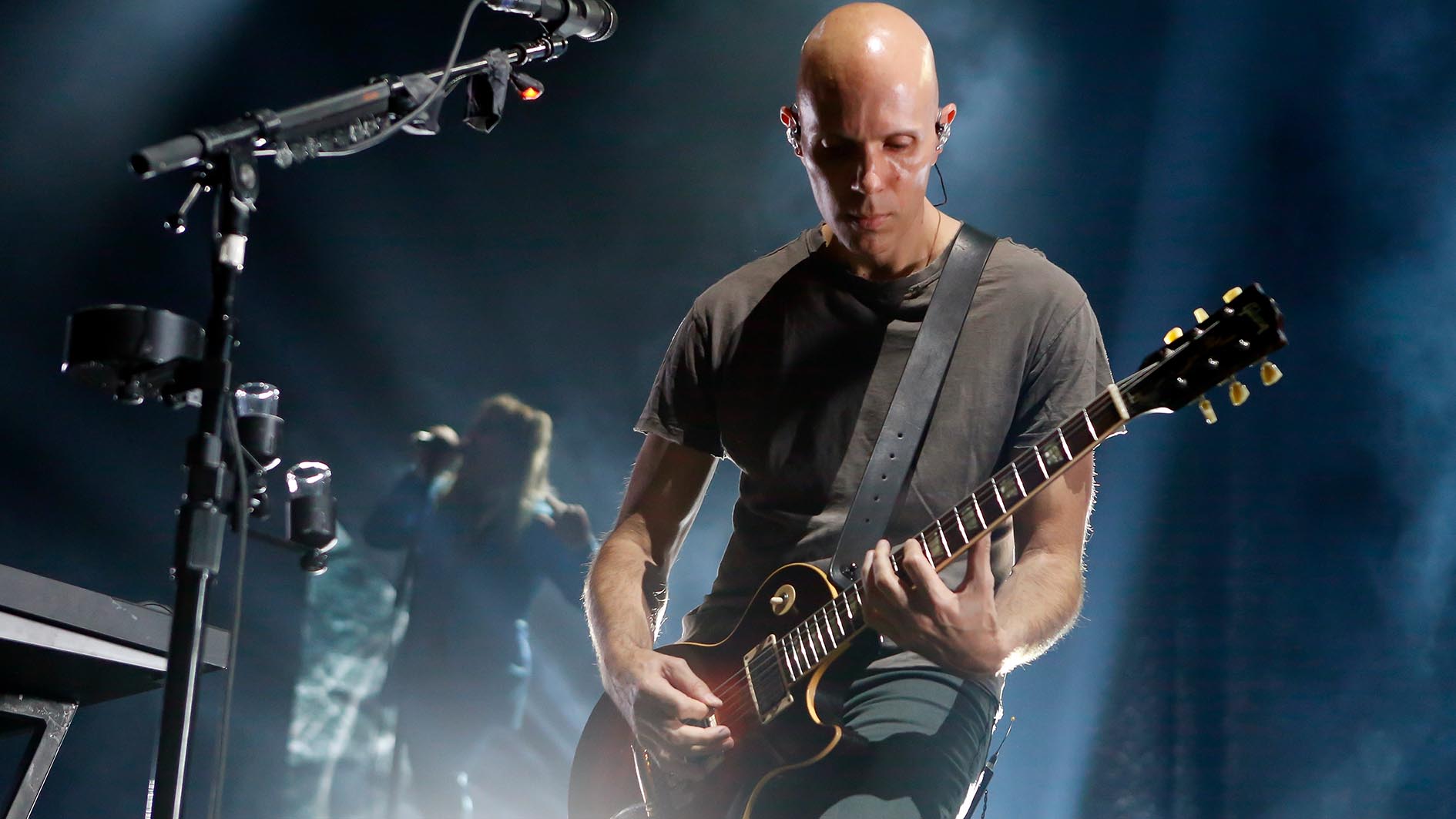
Most famous as the songwriter and backing vocalist of alternative metal supergroup A Perfect Circle, Billy Howerdel's been busy outside of his day job.
In 2008, his side project Ashes Divide released their debut album, a visceral and often-overlooked record. Although new material was hinted at, nothing materialized in the 2010s. And when A Perfect Circle announced Eat the Elephant in 2018, it seemed like Howerdel's extracurricular work might be at an end.
Not so, as it turns out. Howerdel stated several times that a new Ashes record was still in the works. This turned out to be false – only because it was instead revealed that this would be his first solo album.
More electronic with less of a riff focus than anything he's done previously, What Normal Was is heavily influenced by post-punk and new wave, leaning on synths and bass for heaviness rather than walls of guitar.
Guitar World got on the phone to Billy to get the lowdown on the new project, name and direction.
When we last spoke to you, you said you were working on a new Ashes Divide record. What made you decide to put it out under your own name?
“It was going to be called Ashes, up until this past summer. And, you know, I was toying with the name thing even as this album started coming into shape aesthetically.
All the latest guitar news, interviews, lessons, reviews, deals and more, direct to your inbox!
“It was just a different record, quite a different record than ‘Ashes’ would suggest it sounded like. So, if you heard the first Ashes record and you were expecting part two, this is, I think, a departure from that.
“I set out to make that Ashes record, if memory serves, as a faster, more energetic [record], intentions like that, where I don't normally set out with intentions. I'm still proud of that record, but it didn't seem like the right move [now]. There wasn't much different in the process, but in the intention, there was.”
Even so, it feels like there's a link between the closer from Keep Telling Myself It's Alright, Sword, and Poison Flowers.
Finding the right instruments, and what's going to move the story forward, that's always the intention for me
“I think musical DNA shines through... You're onto something, why the choice was made to release that first. There's the connecting tissue between Poison Flowers, and things I've done in the past. There's other colors that are going to be revealed, like in the single we just dropped, Free and Weightless.”
Some of the tracks are a big surprise. Stars is probably the most upbeat and triumphant track you've done to date.
“Stars is the oldest song on the record. I actually performed that live about three times, back in 2009 at the end of the Ashes tour, but it was in a different form. It was in more of a – I'm terrible at describing things without sounding like I'm knocking them, so I'll say something nice.
“It was in a more basic form than it is now, and maybe it's more stripped-down, but it wasn't turning me on, and then when I changed the color palette, it did. Finding the right instruments, and what's going to move the story forward, that's always the intention for me.
“I overcorrected and made a demo for that song which was much more like the Cocteau Twins album Treasure – it would fit on there. Heavy, angular drum machines, very darkwave, doom synths, and then I kind of reeled it back a little closer to the original, and it landed here. I think it needed an overcorrection, though... You get stuck in hearing something a certain way.”
It sounds from that like there were very different influences on this album.
“It's the same stuff I've always drawn on, but with A Perfect Circle and Ashes, some of the things that were the most boisterous took up all the oxygen. Like the guitar – [I was] constantly concentrating on bigger guitars. I always listened to the same things.
“To rewind, this album [started] as a look at 1981 to 1984. That's the time in music, the age I was, that music hit me the hardest. You kind of find your lane, and then you stick in it, as far as the foundation of who you are as a music fan, I think. So that's where I started.
“It's through that era and into the late '80s – I mean, I love things like Gene Loves Jezebel, and Missing Persons, but when I really found the music that I thought I was cool for listening to, when I was 13 years old, it was definitely The Cure, and Siouxsie and the Banshees, things that none or very few of my peers knew about.
“You were in a special club back then – there was no internet or [easy] mass consumption of these things.”
This record for me was going back and making the record I wish I could have made in the early '80s
So a return to your formative years?
“I lived inside that culture in my head. What was it like to be in London? What was it like to be in LA? What was it like to be in these places where these stories were being crafted and this music coming out. [I was] dreaming of all that. So this record for me was going back and making the record I wish I could have made at that time of my life.
“I picked up the guitar when I was like 17, and got into Randy Rhoads, Rush and bands that were more driven by the guitar gymnastics thing, and they're fun to play and there's a satisfying thing in that. That led me to Alice in Chains, which was a big shift for me in the early '90s. But [with this album], I didn't let the guitar take center stage. I wanted the songs to.”
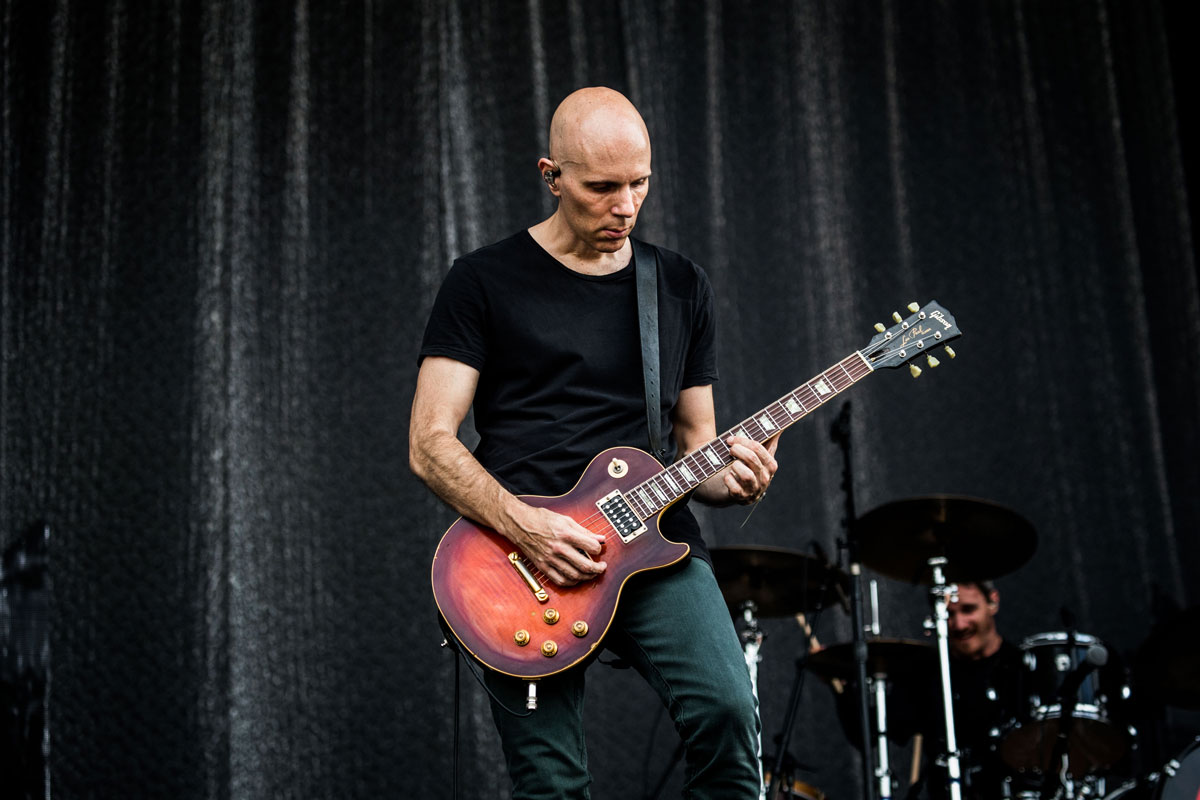
Did the shift in focus to music you listened to before you picked up the guitar change the way you wrote?
“It affected the way I wrote, for sure. As the record was progressing, and I wanted something to be heavier, the tendency [was] to play a barre chord. [But] I don't think there's a barre chord or power chord on the record. Any grind, or low-end power, came from the bass, or dirtying up synths. Things like that.
“The great compliment was playing the record back, and [former A Perfect Circle guitarist] Danny Lohner and I were working on it. He was there the whole time, and he was still like, ‘What is that sound?’ I loved being able to confuse him after the fact, with whether something was a guitar or a synth...
“I wanted it to be so you're not just thinking, ‘Oh, that's a Les Paul through a Marshall stack.’ I mean, I love that too, but that wasn't where my head was for this record.”
On the writing and recording side, how did this differ from Ashes? Or from Eat the Elephant?
“The main thing is that Maynard [James Keenan, A Perfect Circle frontman]'s not involved. Normally, that would be the only difference. Eat the Elephant was unique, because I got an outside engineer to help produce the record. That was the first APC record I didn't engineer and produce – everything up to that point I did. That was a different experience and a totally different process.
Making this album was a little more laborious, going back and revising, and getting it perfect... I do that with certain things, but most of the time I leave a lot of mess in there
“[It was] a little bit more laborious, going back and revising, and getting it perfect... I do [that] with certain things, but I leave a lot of mess in there. I enjoy having these little mistakes in the track, I think that's getting back to the '80s thing. What we love about these things are the imperfections within them.”
What was different about the recording process, other than you being back in the producer's chair?
“With Eat the Elephant, I would just show up to the studio, my amps would be set up, and I could just sit on the couch and play. Normally, and including on this record, the first three APC records, or Ashes, I'm the only one sitting in front of Logic. It's just me, sitting in front of the computer, picking up a guitar and hitting the space bar.”
You do everything at your studio? Even drums?
“I do everything at my house, at my studio. Except Eat the Elephant... I have a very small studio. It's like a little bedroom. It's a dedicated studio, but it's [small] for a drum room. It was one kit set up, and all three of us played. Josh [Freese], Tosh [Peterson] and me.”
How do you go about tracking the guitars? What's the setup?
“I don't usually labor [over] takes. I write the part as I'm playing it. I think there's something to that first impression, in getting those takes. Obviously if I'm double-tracking, I'll learn it verbatim and just go and multi-track it over and over, but I really don't have a lot of riffs or things that I have laying around in my head and then go in to record them. I usually just do them on the fly.”
Presumably you have a scaffold, or an idea for the song first?
“It kind of depends. If I'm writing on piano, I'll do a left hand, right hand where left is bass, right is melody... and the right is what's going to happen on guitar. Or, starting it the other way, I'll start with a guitar line and build a song around it. I guess there's no set formula.
“I will say the only thing that stays consistent is that I do one-take things. Like Poison Flowers, that bassline was written so fast, in one pass... I re-tracked the chorus just to get the sound right.”
When I was a teen I would think, ‘Yamaha guitar, what?’ And I wasn't even a gear snob
What gear did you use for this record? Any new basses or guitars?
“[I used] the same basses I always [have]: a Fender Deluxe P-Bass and a Warwick Thumb Bass. In the beginning of A Perfect Circle I used just the Thumb Bass, but I used the Fender a little bit on [2003's] Thirteenth Step. Now, I kinda go in and out between those two basses. [For guitars] I used mostly [my] Les Paul. I just know how to get different sounds out of it now.
“I also used a Yamaha AES1500. It's a thinner hollowbody [335-style guitar]. It doesn't have a Bigsby, but I wish it did. I'm ready to dive back into that game. [But] it's a great guitar, really solid.
“Going back to snobbery, when [I was] a teen I would think, ‘Yamaha guitar, what?’ And I wasn't even a gear snob. I had a Squier Telecaster as my first guitar, and then a BC Rich ST-III. I don't know why, but when I started playing more metal things, I was like ‘I've gotta get a BC Rich.’”
Those mid-'80s Squiers can punch above their weight.
“I got it in '86, I think it was. It was great, $310 and I still have the receipt. I just put that up on Instagram the other day. I had a teacher from school bring me into Manhattan to buy it.”
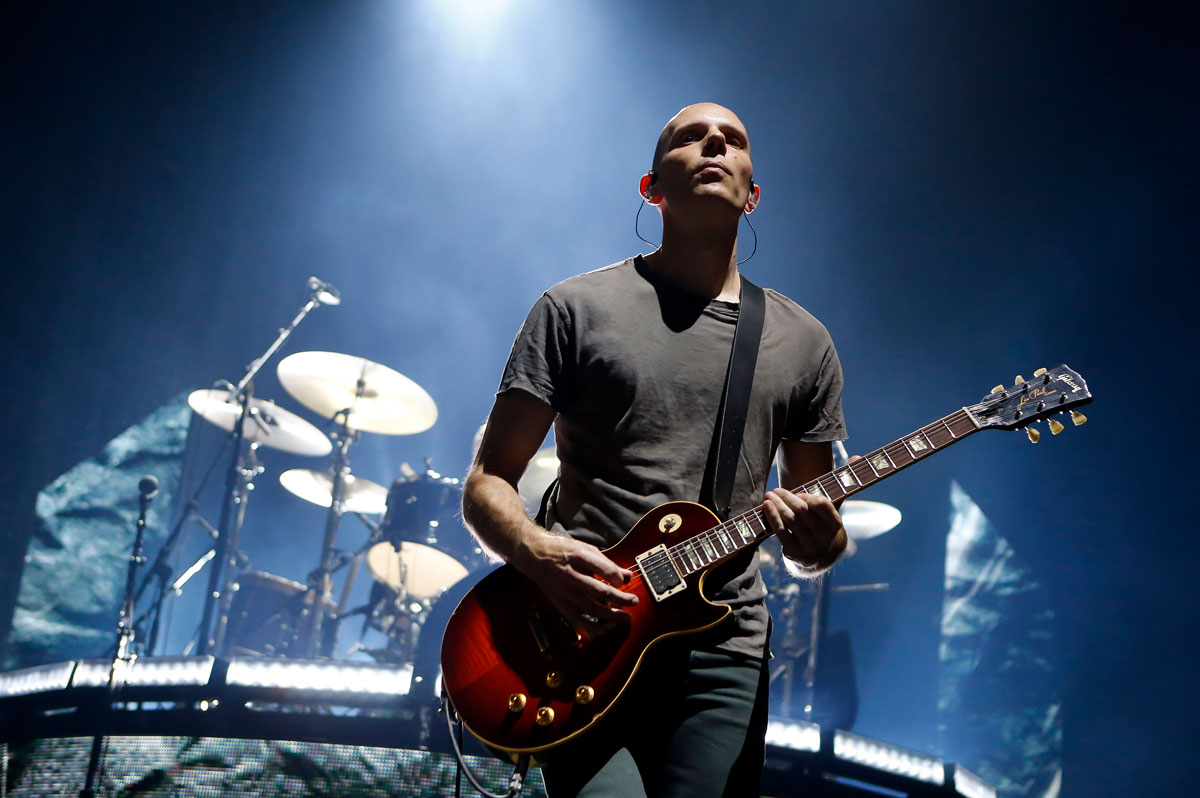
Did any other guitars get used?
“I also used a Gibson ES-175, which is a thicker hollowbody. I prefer the feedback coming from a Les Paul. I find I can bend it to my will a little easier, and it will go crazy, too: if I want to give it the keys to chaos, it will do unexpected things.
“The 175 is great to mic, though – [on] the song Free and Weightless, the main lead guitar is just me mic'ing the body of that 175. It sounds really plastic-y. It's got a really interesting sound, and I don't know that you would identify it as a ‘good’ guitar sound, but I just re-amped that.”
What about amps and effects? Did you use the Axe-Fx more this time around?
“[I used] my Marshall head, which is basically a Friedman head. It's still a Marshall chassis, but it's a head that Dave Friedman customised for me back in the late '90s, and it's been my sound since. Then that little Gibson GA-15 RV. I love that little amp.
I'm so used to getting feedback and having some support from a speaker hitting my pickups, it's hard for me to let it go
“The Marshall is a Super Lead 100 power section, but the preamp is kind of loosely modelled after a 60W Naylor. It wasn't enough power for playing clean when A Perfect Circle started, so I needed that bigger power section. That became what's known as the Naked Head.
“I used a little more Axe-Fx on this record. Normally I just record dry, and then add effects in post, in Logic – the Brigade [chorus], from Universal Audio, and the Ampeg B15. The UA plugins really are a superior product. For guitar sims I've not found the perfect model, but when it's just me practicing, the Suhr 100 Pete Thorn model, I like that.”
And for the tour, will you take out a full rig, or lean on the Axe-Fx?
“[Danny] is going to be playing the things I can't sing and play at the same time. We're talking about how to tackle the guitar rigs on this run. Originally I was thinking of just going direct. We played five songs [like that] back in March, and I liked it, but I'm just so used to getting feedback and having some support from a speaker hitting my pickups, it's hard for me to let it go.
“I think, because there's more unique sounds on this record, I might stick with all preamps coming out of the Axe-Fx. Which are great, and the only reason I didn't use them with APC is that I almost got there with modelling the Naked Head, but it wasn't quite there, and y'know, I have one job to really focus on there.”
Will you run into the power section of your Naked Head?
“For this tour, I'm probably going to use the little one-space Matrix power amps... I'll use the Axe-Fx for everything. I'll plug straight into there.”
You've said you mainly used plugins for the album, and you're not a big pedal guy. Was there anything new that did get used?
“There's two pedals I need for the song Stars, the EHX SYNTH9 and the MEL9 [Tape Replay Machine] – I would maybe not print that. Trade secret. [Pause] that's a pretty amazing combo, man. [Pause, laughs] OK, fuck it, you can print that, but those are a really special thing.”
Maybe we can say that EHX are welcome to send you more toys?
“I've got a bad marketing brain – it's why I never get any endorsements [laughs]. Gibson have been very generous with stuff, but it's partly that I'm not a gear collector. I don't want to get paralysed by choices.”
You've hinted in the past that there might be a signature Gibson, or Friedman. Are we any closer to seeing those become a reality?
“No, I've talked to both companies about it, but I'm not a self-starter. I really want to, too. A, I think it would be really good to have some backups, and B, I think the guitar in particular [is special]. They said they will... maybe after I get off this call I will revisit that!”
- What Normal Was arrives June 10 via Alchemy Records/BMG.
Alex Lynham is a gear obsessive who's been collecting and building modern and vintage equipment since he got his first Saturday job. Besides reviewing countless pedals for Total Guitar, he's written guides on how to build your first pedal, how to build a tube amp from a kit, and briefly went viral when he released a glitch delay pedal, the Atom Smasher.
